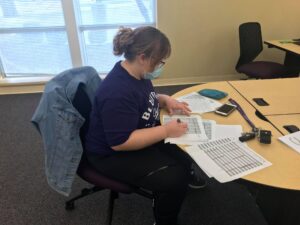Over the course of time since beginning higher education and staying on campus away from home, it is common for students to put themselves out there and take on new responsibilities. These responsibilities can pertain to clubs, jobs (on and off campus), new friends and other extracurriculars aside from their scheduled classes.
Stress tends to accumulate when someone spreads themselves too thin with multiple responsibilities. This stress on students can cause effects like mood swings, lack of sleep or motivation which are noticed by the student’s friends and teachers.
Elizabeth Rockwell is a sophomore communication major who works a full-time job at the Dunkin’ in Bluffton, is a member of the campus concert band, has a job with the music department on campus and is a member of Marbeck Center Board.
Rockwell is one of the shift managers at the Bluffton Dunkin’, which lends her to having a full time position.
“I worked about 15-20 hours last week [for my music department job] on top of Dunkin’ which was 50 hours,” said Rockwell, “And a full course load.”

Sophomore Elizabeth Rockwell checking over an upcoming work schedule for Dunkin’. Photo by Olivia Westcott.
Rockwell feels as though she doesn’t have time for herself or to really hang out with friends. One of her friends works at Dunkin’ with her, and she said how having the same shift is one of the only ways she can get ‘friend time.’
Even though Rockwell has a lot going on, she does enjoy everything she is a part of.
“I think a lot of it for me is experience,” said Rockwell. “I want to know about anything and everything. I am curious about a lot of stuff and I like to know a lot about a lot of things. I want to keep myself busy and I want to show other people that I can balance it. Kind of like just proving a point right now, while also enjoying what I do.”
Wyatt Walker is a sophomore business administration and sports management double major. He is a thrower on Bluffton’s track and field and is also a full-time student. With being on the track team, Walker spends a lot of time at practice and lifting. He gave an estimate how track would normally take his time in the morning from 5 a.m.-7 a.m., and 4 p.m.-6 p.m. In between those times would be studying or class itself if he didn’t have time to return to his room after practice.
Walker sometimes feels as though he doesn’t have enough time for school work, which interferes with his goals for himself.
“With everything that’s going on, I would say I don’t have a lot of time for school,” said Walker. “Which kind of bothers me because I would like to make the dean’s list again.”

Sophomore Wyatt Walker. Photo by Olivia Westcott.
Walker does experience burnout, but will listen to audio books or watch half-hour long shows to give him the chance to escape everything going on. He wants other students to know if they are experiencing similar feelings, they should think about why they are doing what they are doing and aim for the ultimate goal of graduation; or the weekend, for more short-term goals.
Even though he has a lot going on, Walker does appreciate his experience and involvement with track and field. He admits to it being one major reason he is at college.
“I wanted so badly to make life better, and I knew track would keep me grounded in a way by making friends and connections with people where other things might not have let me do that,” said Walker. “It helped me because without it, I probably would’ve dropped out a while ago. They hold you accountable, but in a good way.”
Walker does enjoy what he is a part of, but there are also challenges he faces which are caused by stress. He admits to worrying about school and how it is always on his mind. He worries about if he is up to date on what he needs to know for classes since he feels as though professors can be vague at times.
“When at college, I feel as though I am walking on glass at all times and the wrong step will lead to a major puncture,” said Walker. “Me personally, I constantly stress over an assignment or test or just not being informed.”
Walker and Rockwell have similar ways of telling when they need a break from working. Walker notices it when he is reading and ends up reading the same line over and over again or when he is doing an assignment and tries to say the same thing in different ways. Rockwell notices in a more physical way when she feels as though she wants to sleep all the time.
If students feel as though they are taking on too much, there are counselors available for students to talk to campus to help process anything they may be going through.
To help keep herself sane, Rockwell will often talk with others who are just as busy as she is as well as those who do have time to relax. In general, she believes talking to help her since she is able to receive advice from others pertaining to her situation and stresses.
Although a direct interview wasn’t granted with one of the campus counselors, alumni relations manager and marketing coordinator, Claire Clay, was able to speak with one of the temporary counselors, Sara Lindabury.
When Lindabury is talking to students who are feeling burnt out she finds that many students are having difficulty sleeping, feeling overwhelmed, crying more, eating unhealthy food, difficulty focusing and getting mad quicker. While these are experiences everyone has felt, there is a tendency to think there is something wrong with us as an individual and that it can all be fixed by working harder or working smarter; when the real issue may be over commitment.
When asked if she felt like students were doing too much, Lindabury said, “Many of the students I work with feel overloaded and overwhelmed. Some feel they are on the edge of exhaustion. I understand the desire to be involved with activities and the need to stretch.”
When Lindabury is feeling stressed, she will depend on prayer for comfort. She will also use the acronym HALT, and not let herself become too Hungry, Angry, Lonely or Tired. When doing a check of these on herself, Lindabury said she finds herself able to manage her stress calmly.
For students, Lindabury suggests having good sleep hygiene and end-of-day rituals one would participate in everyday. She also suggests students to have a welcoming space or bedroom they can rejuvenate themselves in. Finally, she suggests one should wait three days before taking on any additional work to give time to think things through and stops one from being impulsive.
Students are able to schedule an appointment within the counseling center by emailing counseling [at ] bluffton.edu.






